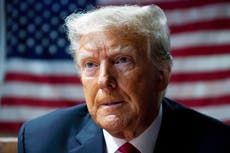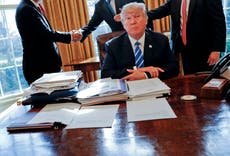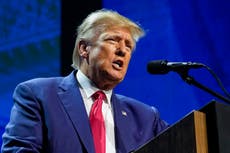Trump-appointed judge will initially preside over ex-president’s federal indictment
Judge Aileen Cannon faced scrutiny for a series of decisions that froze the Justice Department investigation
Your support helps us to tell the story
From reproductive rights to climate change to Big Tech, The Independent is on the ground when the story is developing. Whether it's investigating the financials of Elon Musk's pro-Trump PAC or producing our latest documentary, 'The A Word', which shines a light on the American women fighting for reproductive rights, we know how important it is to parse out the facts from the messaging.
At such a critical moment in US history, we need reporters on the ground. Your donation allows us to keep sending journalists to speak to both sides of the story.
The Independent is trusted by Americans across the entire political spectrum. And unlike many other quality news outlets, we choose not to lock Americans out of our reporting and analysis with paywalls. We believe quality journalism should be available to everyone, paid for by those who can afford it.
Your support makes all the difference.The federal judge who will initially preside over Donald Trump’s criminal indictment in the classified documents case was appointed by the former president and delivered him a series of controversial and favourable rulings during the investigation.
US District Judge Aileen Cannon, who was appointed to the bench in 2020 during Mr Trump’s final year in office, is scheduled to preside over his federal court case in Miami when he faces seven counts in an indictment involving his alleged mishandling of sensitive records removed from the White House and kept at his Mar-a-Lago property. ABC News first reported the development.
Last year, Judge Cannon appointed a “special master” to review materials seized by federal law enforcement and restricted the FBI from using those documents as part of the investigation until she completed a review, effectively freezing the US Department of Justice probe.
That order was ultimately thrown out entirely by a federal appeals court.
The three-judge panel sharply criticised Judge Cannon’s order, writing that it is “extraordinary for a warrant to be executed at the home of a former president – but not in a way that affects our legal analysis or otherwise gives the judiciary license to interfere in an ongoing investigation.”
“The law is clear,” the panel wrote. “We cannot write a rule that allows any subject of a search warrant to block government investigations after the execution of the warrant. Nor can we write a rule that allows only former presidents to do so.”
Magistrate Judge Bruce Reinhart, who signed a warrant for federal authorities to search Mar-a-Lago in August 2021, will preside over Mr Trump’s first court appearance in Miami on 13 June.
With a relatively brief career before her federal appointment, Judge Cannon, among a crowd of Federal Society acolytes who have reshaped the federal judiciary, was confirmed by the US Senate by a vote of 56-21.
She previously served as an assistant US attorney for the Justice Department in the Southern District of Florida.
If she does not recuse herself from the case and she remains a trial judge, she could play a potentially critical role in the case’s development, including whether to set a trial before or after presidential primary elections and the general election in 2024. Mr Trump is seeking the Republican nomination for president.
She also could determine whether to admit certain evidence, decide on motions or dismiss arguments entirely. She also would preside over sentencing, if there is a conviction. Her decisions also would be subject to the review of a federal appellate court.
An investigation from special counsel Jack Smith, who was appointed to lead the Justice Department probe into the former president’s alleged mishandling of documents after leaving the White House, reportedly is looking into whether his lawyers falsely certified that he returned classified records to the government, or whether he concealed them, illegally, and lied to his legal team
Mr Trump is expected to surrender, face arrest, and be formally charged as soon as next week, after a federal grand jury believed there was enough evidence to bring charges against him.
Federal prosecutors are expected to charge him with the willful retention of national defence secrets in violation of the Espionage Act, making false statements, obstruction and witness tampering. A potential sentence, if convicted, could include decades in prison.
The exact charges against Mr Trump have not been announced, and it is unclear whether an indictment against him will remain sealed until it is formally presented in federal court.





